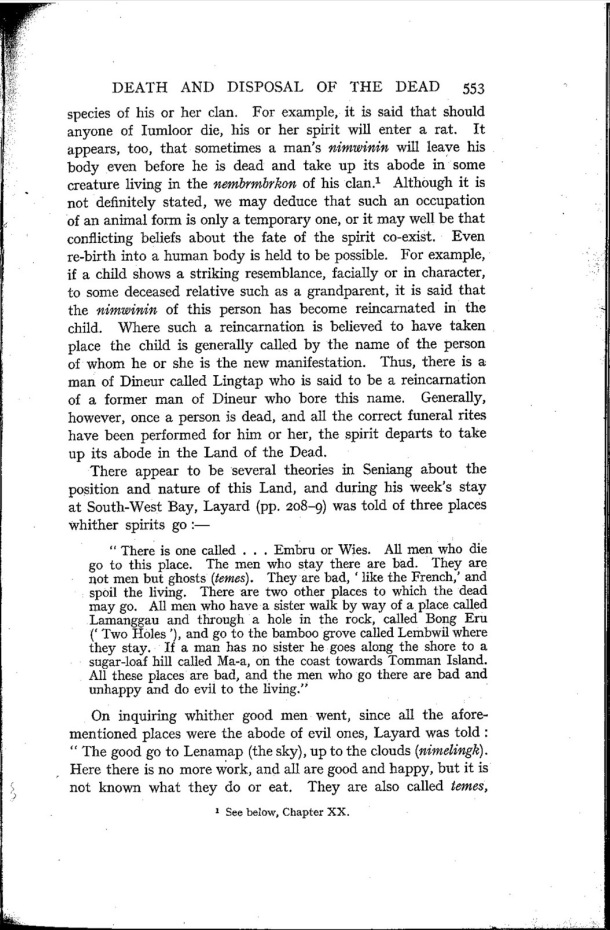|
|  [Note: this transcription was produced by an automatic OCR engine]
DEATH AND DISPOSAL OF THE DEAD 553
species of his or her clan. For example, it is said that should
anyone of Iumloor die, his or her spirit will enter a rat. It
appears, too, that sometimes a man's nimwinin will leave his
body even before he is dead and take up its abode in some
creature living in the nemlrrmbrkon of his clan} Although it is
not deï¬Ånitely stated, we may deduce that such an occupation
of an animal form is only a. temporary one, or it may well be that
conflicting beliefs about the fate of the spirit co-exist. Even
re-birth into a human body is held to be possible. For example,
if a child shows a striking resemblance, facially or in character,
to some deceased relative such as a grandparent, it is said that
the nimwinin of this person has become reincarnated in the
child. Where such a reincarnation is believed to have taken
place the child is generally called by the name of the person
of whom he or she is the new manifestation. Thus, there is a
man of Dineur called Lingtap who is said to be a reincarnation
of a former man of Dineur who bore this name. Generally,
however, once a person is dead, and all the correct funeral rites
have been performed for him or her, the spirit departs to take
up its abode in the Land of the Dead.
There appear to be several theories in Seniang about the
position and nature of this Land, and during his week’s stay
at South-West Bay, Layard (pp. 208-9) was told of three places
whither spirits go :—
" There is one called . . . Embru or Wiesi All men who die
go to this place. The men who stay there are bad. They are
not men but ghosts (temes). They are bad, ' like the French,’ and
spoil the living. There are two other places to which the dead
may go. All men who have a sister walk by way of a place called
Lamanggau and through a hole in the rock, called Bong Eru
(' Two Holes ’), and go to the bamboo grove called Lembwil where
they stay. If a man has no sister he goes along the shore to a
suganloai hill called Ma-a, on the coast towards Tomman Island.
All these places are bad, and the men who go there are bad and
unhappy and do evil to the living."
On inquiring whither good men went, since all the afore-
mentioned places were the abode of evil ones, Layard was told I
" The good go to Lenamap (the sky), up to the clouds (nimelingk).
Here there is no more work, and all are good and happy, but it is
not known what they do or eat. They are also called temn,
I See below, Chapter XX.
|